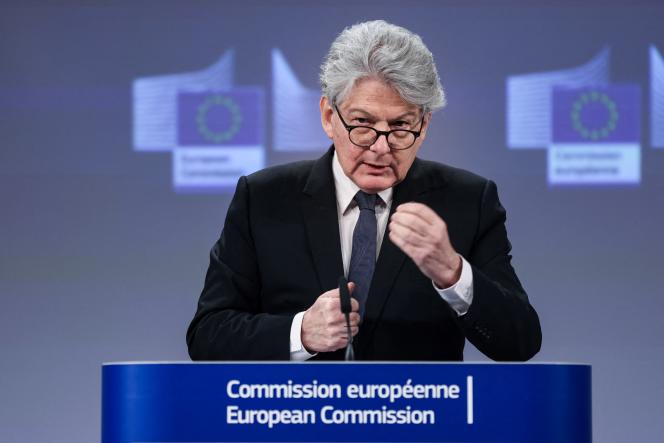“The DMA will open the doors of the Internet”, welcomed, with his sense of the formula, Thierry Breton, Wednesday, September 6, about the Digital Markets Act (DMA). This European regulation of digital giants aims to bring “more choice for the consumer and fewer obstacles for small competitors”, summed up the European Commissioner.
The text takes an important step with the designation of the six major companies concerned: Google, Apple, Meta (Facebook, Instagram, WhatsApp), Microsoft, Amazon and ByteDance (TikTok) because their respective market valuation exceeds 75 billion euros. stock market or because their turnover reaches 7.5 billion euros in the European Union (EU). In addition to naming the companies targeted, Brussels also specified the 22 departments of these companies concerned by the text.
These players now have six months, until March 6, 2024, to propose solutions for compliance with the regulation, which generalizes a priori the application of principles highlighted in the long competition law trials that have notably generated fines for Google: prohibition to favor its own services, to cross-reference data between its services, obligation to open up to competitors, etc.
A challenge
However, the application of this ambitious and unique regulation in the world is a challenge. In the dialogue already begun several months ago with the Commission, Apple, Google, Meta, Amazon and Microsoft are displaying their general goodwill but are also resisting on certain points.
From the discussions on the designation of services, some companies have sought to assert exceptions. In the end, 22 essential services (totaling more than 45 million users in the EU and 10,000 business customers) were selected, including the Google search engine, the mobile environments of Apple and Google, the social networks Facebook and Instagram…
But Microsoft disputed the inclusion of its Bing search engine, saying it would strengthen the leader Google, as well as its Edge browser and advertising management system. Apple asked him to exclude iMessage, which would exempt it from the interoperability obligation provided for in the DMA and supposed to allow communication between messengers like WhatsApp, Instagram and TikTok. Applying it would weaken the security of the service, Apple argued in particular.
On these four contested services, the Commission has agreed to open a market investigation which will have to determine within five months whether they are included or not. Moreover, it has already accepted Google and Microsoft’s request to exclude Gmail and Outlook email software, in particular because they are not an “access controller” between business customers and end users. The phone maker Samsung’s browser also didn’t make the cut. As well as virtual assistants like Siri, Alexa or Google Assistant. Brussels has, however, launched an investigation to determine whether the environment of Apple’s iPad tablets should be subject to the DMA.
You have 65.26% of this article left to read. The following is for subscribers only.
